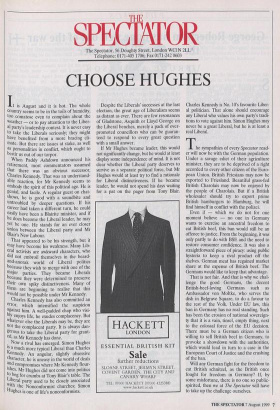SPECTAT THE OR
The Spectator, 56 Doughty Street, London WC1N 2LL t Telephone: 0171-405 1706; Fax 0171-242 0603
CHOOSE HUGHES
It is August and it is hot. The whole country seems to be in the toils of humidity, too comatose even to complain about the weather — or to pay attention to the Liber- al party's leadership contest. It is never easy to take the Liberals seriously; they might have benefited from a more bracing cli- mate. But there are issues at stake, as well as personalities in conflict, which ought to bestir us out of our torpor.
When Paddy Ashdown announced his retirement, most commentators assumed that there was an obvious successor, Charles Kennedy. That was an understand- able reaction, for Mr Kennedy seems to embody the spirit of this political age. He is genial, and facile. A regular guest on chat- shows, he is good with a soundbite and untroubled by deeper questions. If his career had taken a different turn, he could easily have been a Blairite minister, and if he does become the Liberal leader, he may yet be one. He stands for an ever closer union between the Liberal party and Mr Blair's New Labour.
That appeared to be his strength, but it may have become his weakness. Many Lib- eral activists are awkward characters, who did not embroil themselves in the beard- and-anorak world of Liberal politics because they wish to merge with one of the major parties. They became Liberals because they were determined to preserve their own spiky distinctiveness. Many of them are beginning to realise that this would not be possible under Mr Kennedy.
Charles Kennedy has also committed an error, which intensified the suspicion against him. A well-padded chap who visi- bly enjoys life, he exudes complacency. But whatever else the Liberals may be, they are not the complacent party. It is always dan- gerous to take the Liberal party for grant- ed, as Mr Kennedy has done.
. Now a rival has emerged. Simon Hughes is a much more typical Liberal than Charles Kennedy. An angular, slightly obsessive Character, he is uneasy in the world of deals and compromises where Mr Kennedy flour- ishes. Mr Hughes did not come into politics to beg for crumbs at Tony Blair's table. The Liberal party used to be closely associated With the Nonconformist churches; Simon Hughes is one of life's nonconformists. Despite the Liberals' successes at the last election, the great age of Liberalism seems as distant as ever. There are few resonances of Gladstone, Asquith or Lloyd George on the Liberal benches, merely a pack of over- promoted councillors who can be guaran- teed to respond to every great question with a small answer.
If Mr Hughes became leader, this would not significantly change, but he would at least display some independence of mind. It is not clear whether the Liberal party deserves to survive as a separate political force, but Mr Hughes would at least try to find a rationale for Liberal distinctiveness. If he became leader, he would not spend his days waiting for a pat on the pager from Tony Blair. Charles Kennedy is No. 10's favourite Liber- al politician. That alone should encourage any Liberal who values his own party's tradi- tions to vote against him. Simon Hughes may never be a great Liberal, but he is at least a real Liberal.
The sympathies of every Spectator read- er will now be with the German population. Under a savage edict of their agriculture minister, they are to be deprived of a right accorded to every other citizen of the Euro- pean Union. British Friesians may now be exported to Friesland. Beautiful grass-fed British Charolais may now be enjoyed by the people of Charolais. But if a British wholesaler should try to export prime British hamburgers to Hamburg, he will find himself in conflict with the polizei.
Even if — which we do not for one moment believe — no one in Germany wants to exercise an ancestral freedom to eat British beef, this ban would still be an offence to justice. From the beginning, it was only partly to do with BSE and the need to restore consumer confidence. It was also a straightforward piece of piracy: using public hysteria to keep a rival product off the shelves. German meat has regained market share at the expense of British beef. The Germans would like to keep that advantage.
That is not fair. And that is why we chal- lenge the good Germans, the decent British-beef-loving Germans such as Ambassador von Moltke, who serves the dish in Belgrave Square, to do a favour to the rest of the Volk. Under EU law, this ban in Germany has no real standing. Such has been the erosion of national sovereign- ty that it is a vain, tinsel, empty thing, next to the colossal force of the EU decision. There must be a German citizen who is willing to sell British beef in Germany, to provoke a showdown with the authorities, which would lead in turn to a case in the European Court of Justice and the crushing of the ban.
Will any German fight for the freedom to eat British schnitzel, as the British once fought for freedom in Germany? If, by some misfortune, there is no one so public- spirited, then we at The Spectator will have to take up the challenge ourselves.


























































 Previous page
Previous page